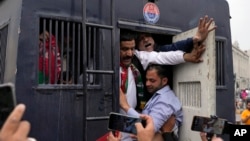Pakistan’s ruling coalition passed a resolution in the lower house of parliament Friday denouncing a U.S. congressional call for a probe into allegations that the country’s February election was rigged.
The legislative National Assembly stated that Pakistan “will not accept any interference in its internal affairs, and the subject resolution is an attempt to undermine the state.”
The resolution comes two days after the U.S. House of Representatives voted 368-7 on Tuesday urging “the full and independent investigation of claims of interference or irregularities” in Pakistan’s election.
It also condemned what it described as “attempts to suppress” Pakistanis’ participation in their democracy through harassment, violence, intimidation, arbitrary detention and restrictions on access to the internet and telecommunications.
“The house deeply regrets that the subject resolution clearly reflects an incomplete and wrong understanding of the political and electoral process of Pakistan,” the Pakistani lawmakers responded Friday in their counter-resolution.
The resolution passed on a voice vote in which no individual votes were tallied.
Lawmakers loyal to the Pakistan Tehreek-e-Insaf, or PTI, party of imprisoned former Prime Minister Imran Khan opposed the resolution. They instead welcomed the U.S. demand for an investigation into what they claimed was massive rigging on a scale never witnessed before in national elections.
Pakistan’s Foreign Ministry on Wednesday rejected the U.S. resolution in a formal response. Its spokesperson renewed the rebuke at her weekly news conference Thursday, calling the U.S. congressmen’s decision unfortunate.
“This resolution is not constructive; it is not objective; it is divorced from the realities in Pakistan, and it is an interference in Pakistan’s internal affairs,” Mumtaz Baloch said.
When asked for comments on the congressional resolution on Wednesday, the U.S. State Department avoided discussing it but said that Secretary of State Antony Blinken and Washington’s ambassador in Islamabad have consistently urged Pakistan “to respect the rights of its people and live with its constitutional and international obligations.”
The February 8 vote, in which no single party won a simple majority, was marred by deadly violence, allegations of military-orchestrated rigging, nationwide mobile phone and internet shutdowns on election day and delayed results. PTI leaders, candidates and supporters were subjected to a nationwide state crackdown in the run-up to the election, forcing many to contest the polls from hiding.
PTI and independent observers have maintained the vote manipulation was solely meant to keep Khan-backed candidates from sweeping the election, allegations the country’s election commission denies.
Khan, 71, has been jailed since August on disputed charges of corruption, a fraudulent marriage and leaking state secrets. Many central members of his party, including women, also remain in jail on disputed charges.
Despite the crackdown, legal setbacks and alleged vote rigging by election authorities, candidates backed by Khan’s PTI won the most seats in the 342-seat National Assembly but were short of a simple majority.
That enabled PTI rivals the Pakistan Muslim League-N, or PML-N, and the Pakistan People’s Party, or PPP, to form a coalition government, allegedly with the military's backing. The PML-N leader, Shehbaz Sharif, became the prime minister.
The election process and its outcome, however, remain contentious. They face multiple legal challenges, some of which also are being heard by Pakistan’s Supreme Court.
Analysts have downplayed the U.S. resolution, saying it will not affect Washington’s policy toward Islamabad.
Just hours before the Pakistani parliament passed Friday’s resolution, Foreign Minister Ishaq Dar hosted a meeting with the U.S. ambassador to Pakistan, Donald Blome.
A post-meeting Foreign Ministry statement said, “The two sides reviewed the latest developments in bilateral relations and discussed ways to move the relationship forward.”
Cash-strapped Pakistan is engaged in talks with the International Monetary Fund to secure a new multibillion-dollar loan to stave off an economic crisis. Economic experts believe Washington’s support will be crucial for Islamabad to negotiate the much-needed bailout package successfully.
